“Mrs. Robinson, are you trying to seduce me?” This iconic line holds a revered place in American film history. Not only is the dialogue of great importance in the film, but also showed the way for filmmakers and audiences to mold their acceptance of extra-marital affairs in cinematic representations. ‘The Graduate’ released in the year 1967 and marked only the second feature of director Mark Nichols. It spring-boarded its troubled protagonist’s fledgling career into global recognition and made him a star. ‘The Graduate’ recorded five nominations at the Academy Awards, winning one for Best Director for Nichols. The coming-of-age comedy is cited as one of the first instances of satirical comedy in film. The brevity in writing is matched by a surprisingly original style of visual expression created by Nichols.
It is not often that you come across moving images so expressive that writing and performances of this stature assume auxiliary importance. Nichols’ extremely steady and observant camera not only captures the characters’ outer tryst with the world, but gloriously delves into the inner turmoil they go through with themselves. It not only patiently surveys the subject’s actions but also imprints their reaction along with that of their neighbors. In almost a novella styled camera set-up, Nichols narrates this bildungsroman tale adorned by hormonal passion and grand betrayals with an infectious honesty and remarkable restraint that captivates and endears. The layered structure of the narrative offers enough avenues for a wide spectrum of viewers with eclectic tastes and proclivities to explore. Let us dissect this timeless masterpiece and look at the nuanced meanings of the complex ideas presented in the movie.
Synopsis
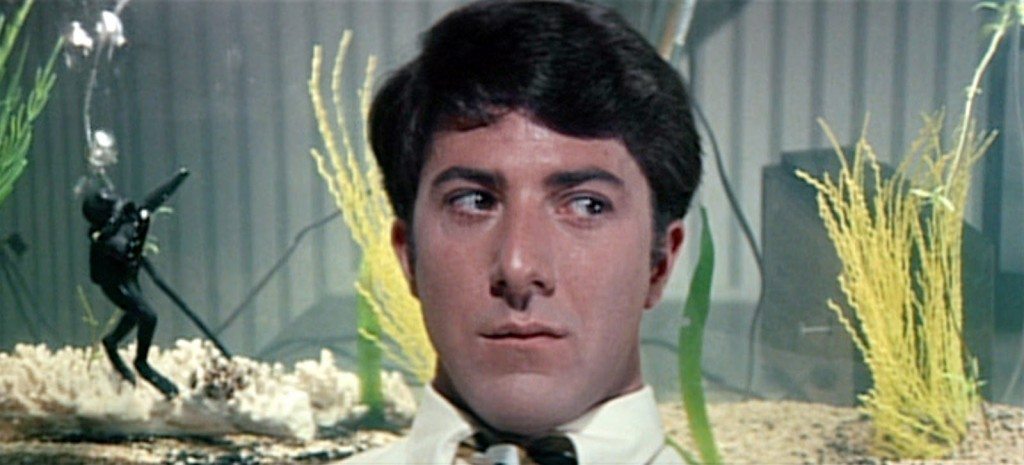
‘The Graduate’ revolves around the post-college life of Benjamin Braddock, a capable and confused bachelor lost in the vastness of life. At his homecoming party, Benjamin is smothered by the love showered on him by his parents and their friends. Amidst the unsolicited celebration of Benjamin’s life, he is beckoned by Mrs. Robinson, the wife of his father’s partner, to drive her home. Initially reluctant, to the extent of handing over the keys to his brand new expensive car, Benjamin finally agrees. On arrival, Mrs. Robinson invites him into her house, feigning a fear of coming in a dark house. After obligatory exchanges, Benjamin is forced to share a drink by Mrs. Robinson, who disables him from leaving, indulging in flirtatious exchanges. The two then shift their conversation to Mrs. Robinson’s daughter Elaine’s room, where Benjamin is propositioned by a naked Mrs. Robinson to have an affair with her.
Narrowly avoiding the suspicions of Mr. Robinson, who arrives shortly after, Benjamin escapes to his haven, where he contemplates the offer. After much deliberation, Benjamin finally surrenders to his post-adolescent curiosity and charts a place for Mrs. Robinson to meet. The Taft Hotel becomes their tempest of deceptive lies and dirty secrets, where they frequent their rendezvous. The period marks a noticeable change in Benjamin’s behavior, indicating his growing maturity and self-confidence.
One night out of boredom, Benjamin probes Mrs. Robinson about the purpose of her extra-marital operations and proceeds to inquire about the nature of her marriage. A perturbed Mrs. Robinson concedes pre-marriage pregnancy as the reason for her unison with me. Robinson, which proves wholeheartedly underwhelming and uninspired for her. It is here that Mrs. Robinson makes Benjamin promise her that he’ll never date Elaine whatsoever the circumstances. Benjamin duly obliges, without anticipating what lies ahead.
The much-awaited arrival of Elaine is realized with a predicament for Ben: either say no and invite further trouble in the form of a family dinner with the Robinsons and run the risk of divulging the secret, or, dare to cross Mrs. Robinson. As it turns out, Benjamin goes with the latter and takes Elaine on a date. But, keeping in line with Mrs. Robinson’s warnings, Ben makes sure he makes the date as horrible as he can for Elaine. He takes her to a strip-diner and when she is reduced to tears and runs out, he consoles her. It is then he recognizes that he genuinely like Elaine, asking for another date when he drops her off.
The next day when he comes to pick her up, he finds Mrs. Robinson waiting for him. She confronts him about the ordeal and proceeds to threaten him even at her own expense. Ben doesn’t heed to her warnings and tries to tell Elaine before her mother can. When she finds out, she cuts her ties with Ben and moves back to Berkely for college.
Benjamin, now convinced that he and Elaine shared a pure connection, travels to Berkely to confront Elaine about her feelings and ask her hand for marriage. Initially rebuked, Elaine comes to terms with her feelings for Benjamin and agrees. But, when Mr. Robinson finds out, he convinces Elaine to marry Carl Smith, a fellow student. When Ben rushes to the Robison residence to confront Elaine, he only finds a vengeful Mrs. Robinson, calm and sarcastic, telling Ben he missed the opportunity. In a crazy climax, Benjamin goes through almost two cities and dozens of strangers to locate the church where the two are getting married. The bizarre ending sees Benjamin shout out for Elaine from behind an enormous pane of glass overlooking the ceremony and stop her from marrying Smith. After rebuking initial waves of protests from onlookers, the two run away on a bus. Burgeoning excitement quickly recedes into pensive deliberation about the uncertain future.
Mrs. Robinson
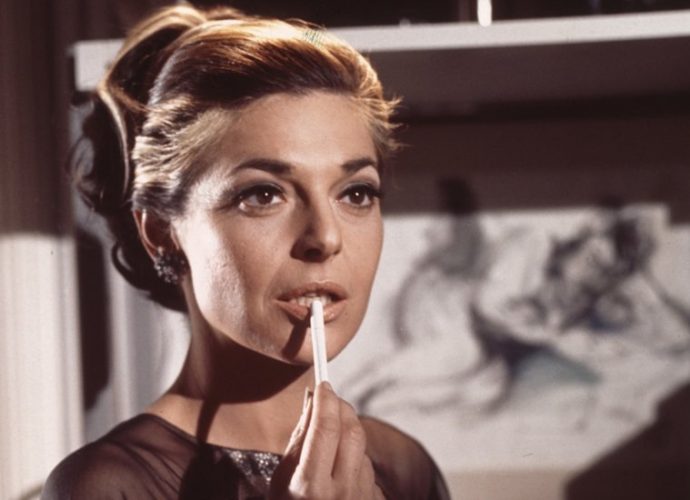
The beauty of ‘The Graduate’ lies in its dynamic dimension of character personalities. With changing times and cultures, our perception of others vastly changes. Mrs. Robinson is a character whose place in people’s construct of the movie has undergone a considerable transformation. Even the great Robert Ebert couldn’t help but review his stance on the vivid character in his two assessments of the movie thirty years apart. Mrs. Robinson is a lot of things. Mrs. Robinson is an enigma; one moment calm like the afternoon ocean, the other a bitter gale on a stormy night. The indiscriminate shades that the brilliant Anne Bancroft paints Mrs. Robinson with are glorious and well-worthy of immense praise. It makes the assessment of the character so much more interesting and open to subjective opinions.
As it stands, Mrs. Robinson is the catalyst in the movie and by far the most important condiment to the stale dish that is Benjamin Braddock. The first six minutes and forty-five seconds are random and empty, pretty much like Ben’s life. The blandness in his existence is expertly brought out by Nichols through the use of mute colors and a covey of useless props who hold no significance for Ben. Then suddenly the claustrophobic and forever-moving camera stops and gazes over a sumptuous subject, intently looking on with a half-burnt cigarette and wanting eyes. Her introduction to Ben’s life not only treads him on a transitional phase in his life, but also gives something to the viewer to look forward to in the story. She enables the progression of the story and acts as Ben’s bridge from adolescence to adulthood.
The portrait, though, that Nichols paints of Mrs. Robinson is an unrelenting one; like a barren field that uses and discards seasonal rainfalls. The grimly sketch is neither aloof from a wilful sadist, who bathes in human misery, nor too detached from the reality of unhappy partners in marriage. After all, the very sanctity of the institution is built upon the tenets of togetherness and human compassion. Mrs. Robinson doesn’t share an empathetic view of her husband, not because of his shortcomings, but that of her circumstances.
The only real moment of human interaction she shares with Ben is the one where they talk about Elaine for the first time. The discomfort on her face indicates a grey area in her mysterious past that she loathes revisiting. The mere mention of her marriage flashes an untypical grimace on her pristine face that reduces her to an ordinary, resentful woman. Her foray for intimacy vires her marriage has two different interpretations in two different eras. In his review of 1967, Roger Ebert voiced with the majority and declared Benjamin to be a victim of Mrs. Robinson’s whims and a prey to his parent’s draconian authority. Almost thirty years later, a revisit of the film diametrically changed Mr. Ebert’s views. Excerpts from his review read: “Well, here *is* to you, Mrs. Robinson: You’ve survived your defeat at the hands of that insufferable creep, Benjamin, and emerged as the most sympathetic and intelligent character in “The Graduate.” How could I ever have thought otherwise?”
The Sound of Silence

There’s something uniquely peaceful and chaotic about Simon and Garfunkel’s intricate symphonies. The contemplative lyrics carry a deep meaning and share a faithful relationship with the film’s lost protagonist. ‘The Sound of Silence’, initially a failure, which even led to the pair splitting up, rises to the occasion in magnificent fashion to accompany Ben’s odyssey from adolescence to adulthood.
What is noticeable in the film is the use of the song. It only plays thrice; in the starting scene, the phase where Ben has the affair with Mrs.Robinson, and in the ending. If you have a look at the background of the song, it was written by Paul Simon in similar circumstances as Ben and around the same age. The lyrics focus on the emptiness that surrounds us and the deliberation on whether or not there is an escapade from it. This is the very emptiness that defines Ben in many ways. His parents and their friends see him as a walking list of accomplishments and nothing else. He is blessed with all luxuries in life, yet yearns for that one elusive part that will complete him. Having said that, all the three instances have a common thread: uncertainty.
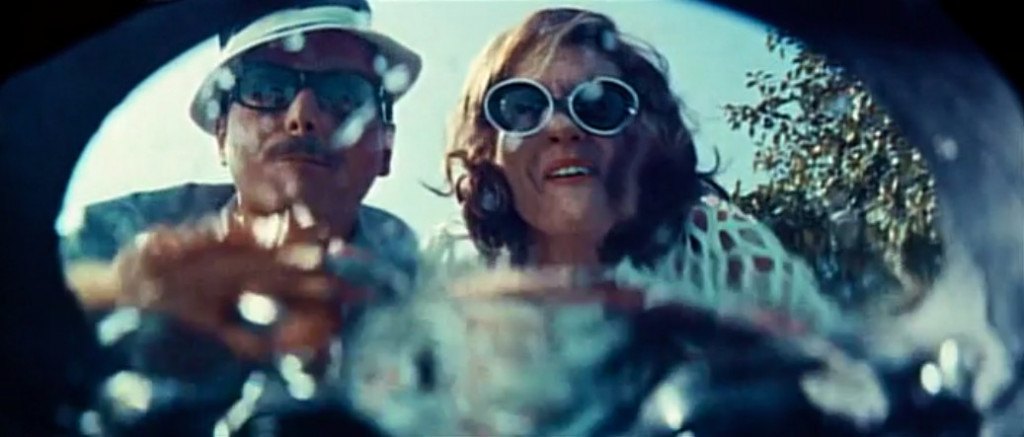
On the first occasion, Ben’s uncertainty pertains to his immediate future; a future that is so lost on him that he loses control of his present. The opening sequence places him against a backdrop of white, metaphorically depicting a kind of limbo state where he finds himself. He is caught between two worlds that are far-reaching and don’t care for him too much. The second time the song shadows Ben is when he has the affair with Mrs. Robinson. This marks a fundamental change in Ben’s personality. His constant brooding over the future is brought to a temporary stop and his obsession with the one most exciting thing in his life takes over. His routine, brought to life by an amazing five-minute transition routine by Nichols, makes the nights the only thing that he waits for. His life is considerably calmer than the first phase but has now been trapped by the vagaries of female companionship.
The uncertainty here is the duration of his affair with Mrs. Robinson, probably the only constant in his life that he enjoys. The third and final part is the ending, when he and Elaine run off together to an uncertain future. This will be extensively discussed in the explanation to the ending.
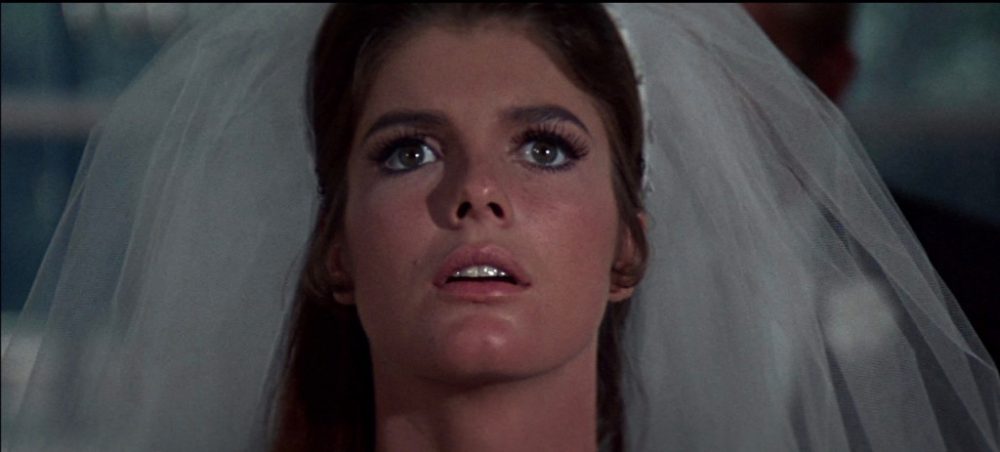
There are two instances where cinematographer Robert Surtees and Nichols use silence as suppression and denote the overbearing parental authority over Ben and Elaine. These genius moments derive from the meaning of the song and draw the two protagonists against each other. The similarity between the two is brought out by these two instances, which fills them with the urge to act out. The sound of silence guides them to an uninformed decision and an uncertain future.
Rebellion
One of the biggest underlying themes of ‘The Graduate’ is rebellion. We are presented with the same in the form of Benjamin and Elaine. Both are subject to strict parental control and hardly lift a finger of their own will. They are successful in their respective colleges, although Ben’s accomplishments are highlighted explicitly in the movie and Elaine’s are not. Even the first time that they go out, the parents, both Mrs. Robinson and the Bradocks play important roles. This acute bridge between their free will and consent and the actions they perform gives rise to a rebellious urge to act out.
Nichols establishes Ben’s frame of mind beautifully through his nuanced camerawork. The opening sequence at the house is claustrophobically filmed, with no real intention to make sense. The celebration of Ben becomes an asphyxiating eulogy that binds him to the mortal and presumptuous world of his egotistic and authoritative parents.
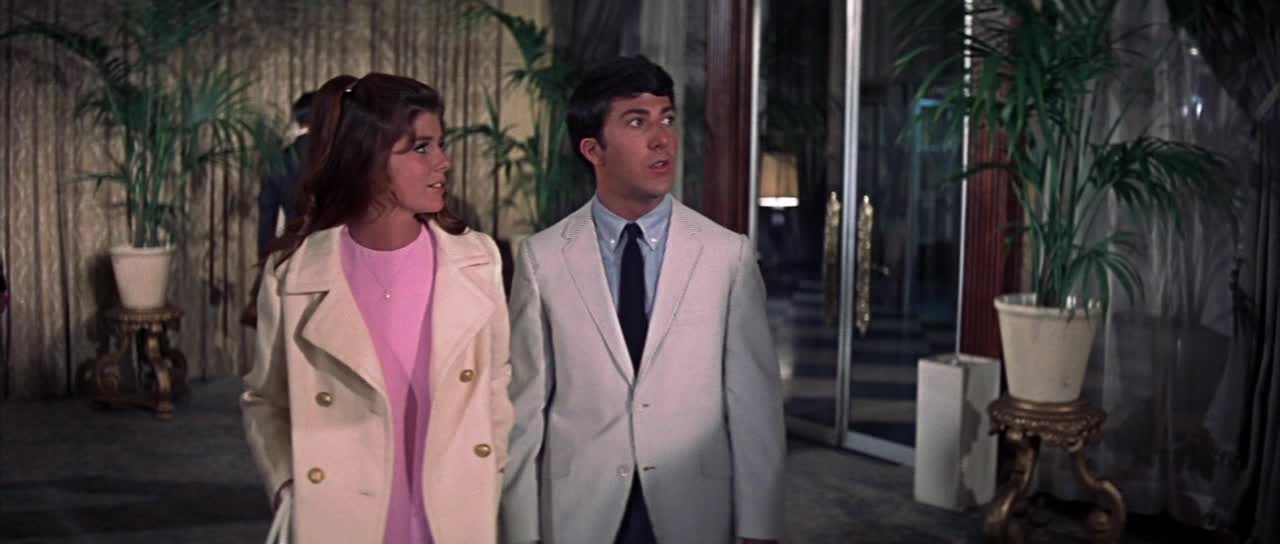
Apart from the two obvious choices to channel this rebellious, free-spirited tendencies, director Mike Nichols also puts into perspective the consequences of urges in the form of Mrs. Robinson. The Mrs. Robinson we know is revealed to be a hardened semblance of the once exuberant and vivacious belle of the past. Through her conversation with Ben that night at the hotel, the viewer is apprised of her rebellious past and the consequences she has to face the present day. Post-teen pregnancies aren’t a rare occurrence but often place its victims in dire positions.
By obstructing Elaine and Ben’s unison, Mrs. Robinson tries to make sure that her mistakes of the past are corrected and her daughter doesn’t suffer the same fate she does. Even though she isn’t regretful of having Elaine, her relationship with Mr. Robinson is one that she loathes and disgusts. In hindsight, this makes Mrs. Robinson a caring protagonist, a champion of liberation and self-expression. This complete change of roles brands ‘The Graduate’ as a film viewable from many perspectives. Rebellion, thus, isn’t limited strictly to Elaine and Ben, but also extends to Mrs. Robinson’s past and her present-day predicament.
The Ending
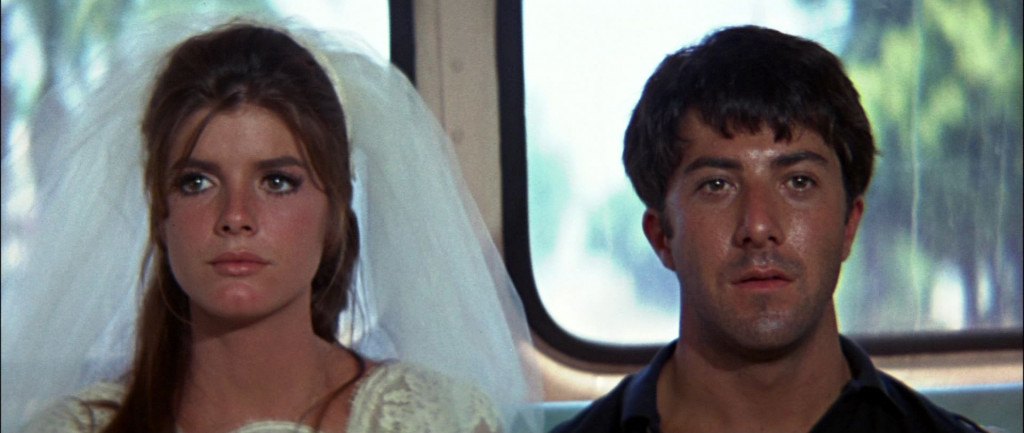
‘The Graduate’ ends on a highly vague note. After Ben is successful in finding the church where Elaine and Carl are getting married, he shouts out for Elaine and stops the marriage. The two then board a bus to run away. Initially, they rejoice in their victory over parental authority, but eventually, the two slam back in reality and ponder their actions. The ending of ‘The Graduate’ is highly inspired by Harold Lloyd’s 1924 masterpiece, ‘Girl Shy’. Lloyd also served as an advisor on the movie’s ending. Understanding what the sudden change of emotions on Ben’s and Elaine’s face will require a thorough observation of intricate moments the characters share in the film.
The common thread that connects Elaine and Ben is being subject to strict parental control. Every decision they take in life is heavily influenced, and at times taken for them, by their parents. Being in the stage of life that they are, this overbearing control can feel like an unsurmountable jail. This often prompts youngsters to act out and deteriorate their relationships with their parents.
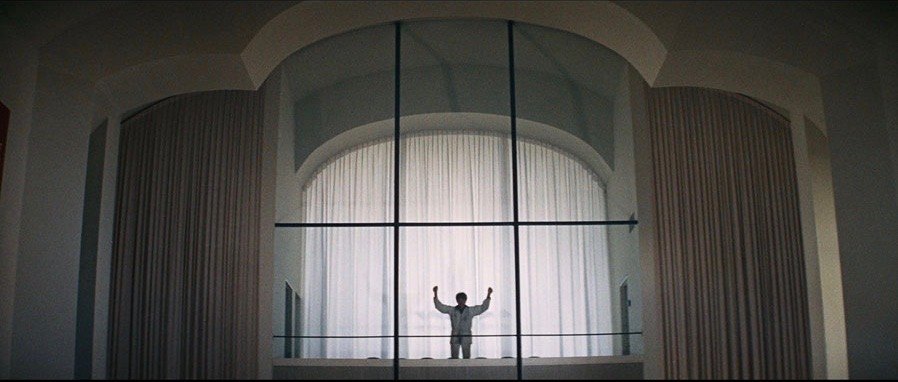
The constant stifling makes them a prisoner of their parent’s whims and fancies. Ben is the first subverted character we encounter. Initial scenes extend the authority over him to his parent’s friends as well, evident from his encounter with Mrs. Robinson, who holds him back forcefully for drinks, and even Mr. Robinosn, who pours a different drink than what Ben wants. His window of opportunity to absolve himself of this control shows up in the form of Mrs. Robinson and her offer.
The affair binds Ben in a moral quandary: cross his parents’ trust, or liberate himself by having the affair. His conscience is so habitual to the control that even when he’s alone in the room with her, he almost walks off, save the egotistic attack on his masculinity by the manipulative Mrs. Robinsonn. That sets a phase where he sees less of his parents and spends more and more time with him. He’s no longer afraid and is unapologetic in his dealing with his parents. All he knows now is to go against whatever he’s been told to do. Dating Elaine is something that falls in this category. Gradually, the resistance transforms into obsession.
Elaine sails in a similar boat, though the extent and magnitude, of what we know, of the authority over her, is lesser. The ending sets a precedent for Elaine. When she sees Ben, standing courageously behind the window pane shouting for her, she goes through an epiphanic moment.
The very next scenes we see her parents and Carl mouthing instructions for her. She sees an opportunity to break through the superstructure of control that has subverted her and gladly embraces it. In their bid to liberate themselves and fly off into the future as independent adults, Elaine and Ben realize they’ve done so with the sole intention of battling a consequence. Do they even love each other? What will they do next? These are two questions which instantly hit the two. The sudden change in emotion is a realization of the consequences they’ll face in the future. Going back now would prove to be calamitous for their self-pride, something which they can’t afford to do.
Final Word
A hard-hitting masterpiece about the trouble of finishing school and finally having to become an adult, whether you want to or not. Benjamin is one of the most relatable characters on-screen, ever – impulsive, anxious, just trying to please everyone and by doing so never pleasing himself – and the cinematography is so ahead of its time and well done, boasting imagery so intelligent and subtle that I don’t think I have ever seen character driven imagery done so well in cinema overall. Simon and Garfunkel’s exceptional score contributes immeasurably to the tone of the film that sets a precedent for the industry to match. An underrated masterpiece that deserves a watch for the mere presence of Dustin Hoffman.
Read More in Explainers: Manchester by the Sea | Moonlight | Dexter

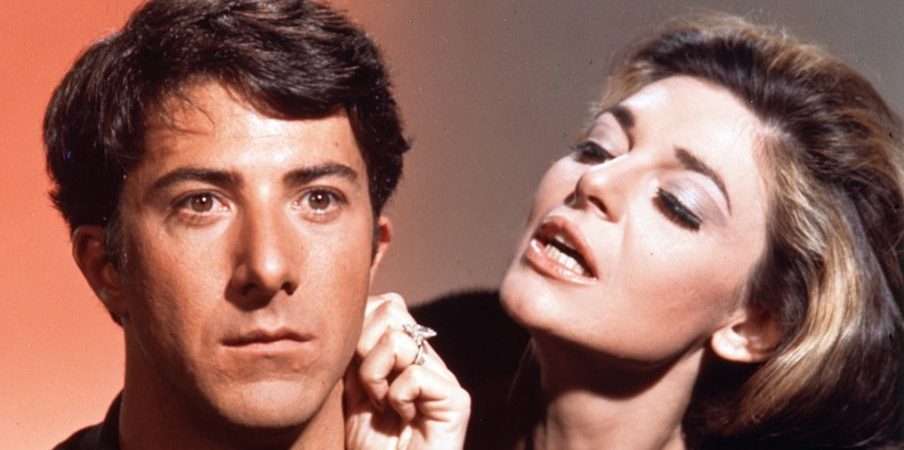
You must be logged in to post a comment.